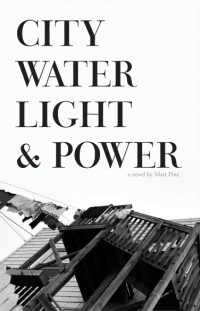25 Points: City Water Light & Power
 City Water Light & Power
City Water Light & Power
by Matt Pine
Cairn Press, 2013
180 pages / $18.00 buy from Amazon
1. I’m in awe of Matt Pine’s prose style. A lake has “the same texture and tone as ink spilled onto silver.” A black dress has “the same cling and quality as plastic wrap on American cheese.” These similes give me goosebumps.
2. The frisson of encountering high style in a world that no longer much values it.
3. City Water Light & Power explores the angst of being young in the city and not knowing the score. It’s about twentysomething Chicagoans figuring out how to survive in body and soul — the alternatives, in this novel, are selling out or breaking down, in bars where salaries are “revealed like flashed genitalia” or in alleys where it’s “spiritually dangerous walking there dispirited after dark.” Your choice is to be one of the manipulators, or someone who walks without a destination — both flavors of desperation.
4. Chicago is a character in this novel. A machine whose workings are dangerously hypnotic.
5. A study of corruption and alienation that gives me that sense of a ruthless and inscrutable society I get from Fitzgerald, say, or Salinger. Matt Pine writes of venality in a tone of innocent fascination — he is sensual, aggrieved, and mystified by ordinary life, in a classic American tradition harking back to the Puritans.
6. The demolition of a dive bar stands for what’s being lost. The bar is called Lewis & Carol’s… perhaps to suggest a world down the rabbit hole or through the looking glass?
7. I like it that this bar seems to be the only thing keeping Jake from becoming an alcoholic – after its destruction, Jake takes to drinking outdoors. Somewhat illogically since the novel acknowledges there are other bars in Chicago – one might even say too much of this novel takes place in bars… But these bars are full of phonies, not like Lewis & Carol’s, which stands for community.
8. Many first novels by men include a dazed and confused main character. In this case, Jake. His job involves talking to imaginary customers. His free time is spent with an imaginary friend, a woman visible just to him, who communicates only through mime and gymnastics and might work better in a movie, a mute hallucinated character being tricky to pull off in a novel…
9. Adrian is a character who success brutalizes. He is seeking the wrong nourishment, acquiring what David Mamet has called “the canting language of the real-estate crowd.” There’s beauty in the process of making ugliness happen, Pine suggests, but it’s a lonely beauty.
10. Jake is a half-hearted preserver, Adrian a developer. Jake on Chicago – “But I wonder what it is we’re wanting after. If it’s really the city, I mean. Do we want more of it, or do we want what it was? I’m sorry. I’m not articulate today. I guess I wonder why we have to fight the city for it to stay itself? Because isn’t that stopping it from being itself? And yet it’s so glorious.” Adrian on Chicago – “What would lure a boutique? How many patios were necessary to make an enclave of patios? Did condos come before cuisine? But then who would move into this wasteland? But why would you open a business where no one lived? It all seemed to leap out all at once, all the parts dependent on all the parts, like a stone archway. But also like an archway, there must be a way to build one.” READ MORE >
August 27th, 2013 / 6:45 pm
